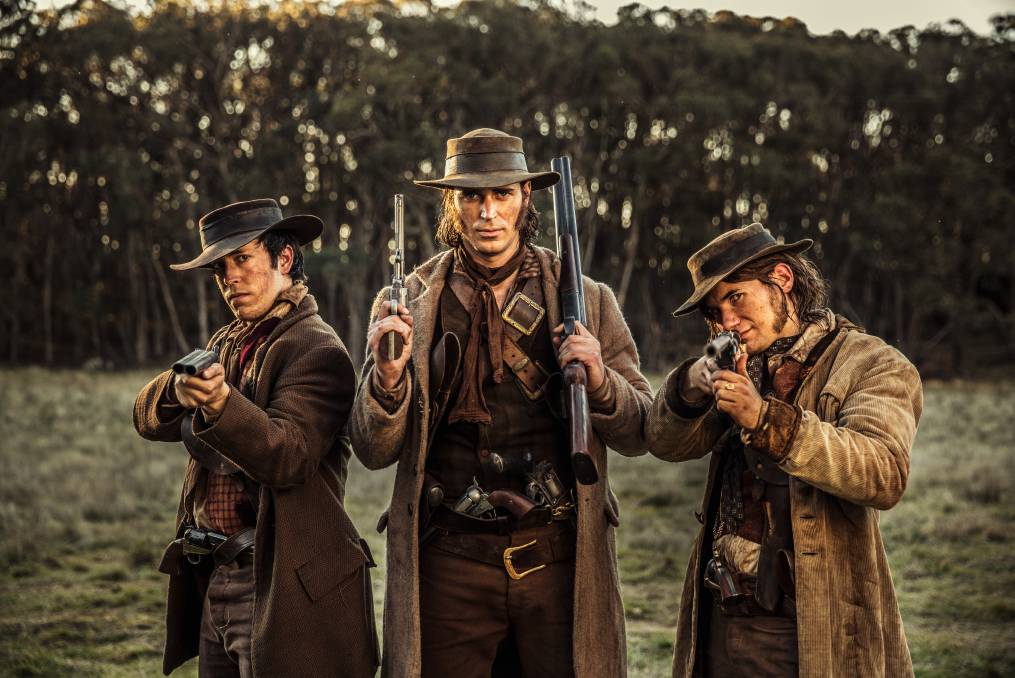
Film poster for The legend of Ben Hall (released December 2016). Hall was an infamous bushranger, glorified posthumously.
Adrian Quaid ~ Evan Ryan ~ Michaela Duffy
The relationship of Irish people with law and order in Australia during the long nineteenth century is one often represented in the modern media with a certain bias. Irish immigrants and their descendants were sometimes stereotyped as criminals in the representations found in the historical press.[1] Although commonly depicted in this way, the Irish actually played many different roles, existing on both sides of the law and, in some cases, transitioning successfully from one side to the other.
It is undeniable that there were many instances during this period where individual Irish people courted and gained notoriety through criminality. Some of them were bushrangers, or convicts who had escaped prison, or from the properties of landowners to whom they had been assigned as servants, to live in the Australian bush. They lived on the wrong side of the law, on the run from the authorities, living off the land, being supported by or stealing from free settlers.[2] Notorious convict bushrangers like Martin Cash, originally from County Wexford, were also popular, blurring the line between villain and hero; Cash was dubbed the Robin Hood of Van Diemen’s Land (now Tasmania).
The fame and admiration that these criminal figures garnered is something that has only increased in the time since the period itself.[3] The most famous of these – and one of Australia’s folk heroes – is, of course, Ned Kelly who was eventually captured and hanged in 1880. [4] Though of Irish descent, Kelly was Australian-born, as was Ben Hall (see film poster above), indicating the longevity of this association for certain individuals with Irish heritage.
The Irish in Australia existed as many other nationalities did, on both sides of the law. The case of Peter Lalor of Queen’s County (Laois) is instructive in this respect. Although he was initially labelled as a ‘rebel’ and criminal, he later went on to become an elected politician in Victoria! His story highlights the utility of studies of individual Irish immigrants in colonial Australia during the long nineteenth century.
On account of the adoption of the bushranger (Irish and other) as something of a national stereotype, the stories of immigrants within the police force of Australia are sometimes overlooked.[5] As well as the contemporary misrepresentations of certain individuals, this is partly due to the poor records of – and historiography surrounding – these roles played by the Irish. Although there is a wealth of information available on the lives of the Irish immigrants during this period, there is seldom documentation dealing exclusively with their work within the police force. Despite being largely overlooked, Irishmen, like James Coulter of County Mayo, and Martin Brennan, Kilkenny, did play important roles – on the right side of the law!
REFERENCES
[1] Kelly Fuller, Lauren Fitzgerald and Jennifer Ingall, Who isn’t related to a bush ranger? (New England, 2010), ABC New England North West (http://www.abc.net.au/local/stories/2010/08/10/2979127.htm) (26 April 2017).
[2] Pat O’Malley, ‘Class conflict, land and social banditry: bushranging in the nineteenth century Australia’, Social problems, 26 (1979), pp 271-283.
[3] Manning Clark, A history of Australia: volume iv: The earth abideth for ever 1851-1888 (London, 1992), pp 165-219 (‘The bush barbarians’); 319-356 (‘Uproar in the bush’).
[4] Paul Eggert, ‘The bushranger’s voice: Peter Carey’s “True history of the Kelly Gang” (2000) and Ned Kelly’s “Jerilderie Letter” (1879)’, College Literature, 34 (2007), pp 120-139.
[5] ‘Browsing occupation: police officer’, Australian Dictionary of Biography, National Centre of Biography, Australian National University (http://adb.anu.edu.au/biographies/occupation/?occupation=police+officer&rpp=200) (26 April 2017).